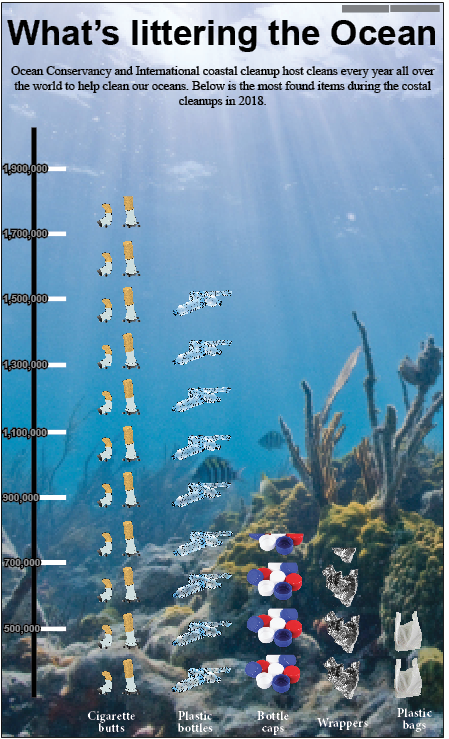Plastic straws, not the real problem
February 21, 2020
Getting rid of plastic straws is like putting a band aid on a broken arm. It’s the wrong solution.
Yes, debris in the ocean is a real problem and we do encourage saving marine life. We just don’t believe in trying to pretend like we are making a difference when in reality we aren’t truly changing anything.
Attempting to ban plastic straws is a feel good solution. We always want to make a difference, all of us strive to make a difference and to have a better earth. We want to feel like we are making a difference even when we aren’t doing anything.
According to Jim Leape, codirector of the Stanford Center for Ocean Solutions, plastic straws make up less than one percent of ocean debris.
Anyone can walk around with their plastic bottles and plastic bags, but God forbid anyone want to use a plastic straw to drink with. Not to mention that many disabled people rely on using plastic straws to stay hydrated.
While there are substitutes for plastic straws, they are barely comparable. Biodegradable straws fall apart within minutes and disabled people can easily bite through them. Metal straws aren’t flexible, so they aren’t functional for disabled people either, plus they need to be washed which some aren’t capable of doing.
It’s not just restaurants banning plastic straws but schools are too. Our cafeteria replaced our plastic straws with paper ones.
There’s more problems with the paper straws besides the fact they aren’t a realistic alternative. Paper products require more energy and resources to manufacture than plastic products. Plus they still have the ability to harm marine life, so paper straws are technically worse than plastic straws.
The real problem with our oceans is countries like China, Indonesia, the Philippines, Thailand and Vietnam who don’t properly dispose of their waste.
According to Public Radio International, an American public radio organization, these five countries only properly collect about 40 percent of their garbage.
In those countries sanctioned dump sites are purposely set up near rivers that lead into the sea. The reason being according to Ocean Conservancy, is that the waste will be carried away by heavy rains or currents, just so they can refresh the capacity of the dump to receive more waste.
Although this isn’t a problem directly in the United States, it directly affects our oceans. We can help these countries develop plans to create a real disposal system and enforce health code laws. This can be costly, but paper straws cost 10 times more to produce so we are going to lose money one way or another.
We need to face the reality of our situation and realize that we are banning a necessity for some. We need to address the root of the problem and move on from there.
We can start at home and make sure we are doing all we can to stop ocean pollution and then go help other countries to reduce ocean pollution at its max. Then we can focus on cleaning up the mess we have already made.


